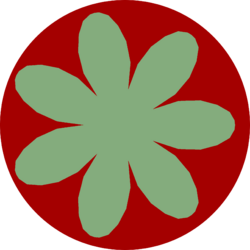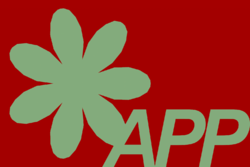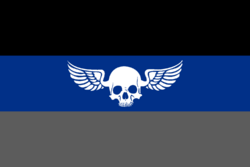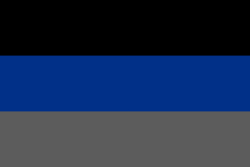User:TruncateVirus99
Contents
Personal Notes
- Don't put categories into square brackets in drafts, but include them nonetheless
- All flags are 1000 tall, 1500 wide (2:3 ratio)
- Except when it looks dumb
- Deathbats are W710 H280 when standalone,
- Avengis watermarks on district flags are 400 wide, 266 tall
To-Do List
- All Pages
- General Upgrades
- Make QoL edits when possible
- Look at other pages and steal headings
- General Upgrades
- Avengis
- Finish Government section
- Write Political subdivisions subsection
- Finish table
- Calculate Population for below districts
- Nyx
- Solas
- Leprus
- Farrea
- Senekaa
- Droken
- Tryfett
- Ilmonte
- Othovag
- Population left to distribute: 3,054,278
- Calculate Population for below districts
- Finish table
- Write Political subdivisions subsection
- Write Economy section
- Write Demographics section
- Write Languages subsection
- Write Culture section
- Finish Government section
- Haides
- Write History section
- Write Administration section
- Write Demographics section
- Write Economy section
- Suurtükkide Hümn
- Write Introduction section
- Fill out Infobox
- Add more Headings
- Write Introduction section
- Flag of Avengis
- Redo Deathbats on already-made flags
- Design Other Current Flags
- Military
- Army
- Army Flag
- Air Force
- Air Force Flag
- Militia
- Militia Flag
- Army
- NGO
- Sporting Flags
- Military
- Write Symbolism section
- Write History section
- Design Historical Flags
- Agrarian Progressivists Party
- Write Introduction
- Fill out Infobox
- Add Headings
- Write Introduction
- Avengisian language
- Write History section
- Write Dialects section
- Pages to draft and create
- Hiidlesta archipelago
- Idamaa
- Keskmaa
- Districts of Avengis
- Symposium of Unity
- Haides Capital Area
- Nyx
- Careon
- Sidewinder
- Solas
- Andronikos
- Leprus
- Farrea
- Senekaa
- Droken
- Tryfett
- Ilmonte
- Othovag
- Avengisian people
- Head of the Avengisian Council
- Council of Avengis
- Tribes of Avengis
- Avengisian Confederation Era
- 2008 Avengisian general elections
- Agrarian Progressivists Party
- Lennart Kass
- Andronikos University of the Arts
- Teeseda
- Suurpart
- Jadekiiver
- Savmi
- Retrovertiigo
- Selfti
- Hullkübarsepp
- Reekviem
- Remenissioonid
- Mattel
- Selgeltnägemine
- Mustvihm
- Üldkogu
- Evald Putsep
- Valli Ruutli
- Reeli Laurits
- Tauno Rebane
- Kristen Sokk
- Einar Paasuke
- Reigo Kross
- Romet Kotka
- Marleen Jogi
- Täitevkojad
- Seadusandlus Koda
- Vene Secondary School
- Abortion in Avengis
- LGBT rights in Avengis
- Päikesepaiste riots
- List of political parties in Avengis
- Kerti Määtö
- Consilium (think tank)
- Kerti Määtö 2000 councillor campaign
- 2012 Avengisian general elections
- 2012 Avengisian general elections in Nyx
- Juho Kuutel
- 2012 Agrarian Progressivists Party councillorial primaries
- 2016 Avengisian general elections
- Administrative divisions of Avengis
- 2020 Avengisian general elections
- Equal Union Act of 2017
- 2024 Avengisian general elections
- Saint Vasilius Eastern Orthodox Church
- Portal:Avengis
- Tassitud Sea
- National Architects Association (Avengis)
- Sidemia (architecture firm)
- Koevvia
- Sidewinder City Hall
- Tassitud Maritime Museum
- Retrovertiigo Mercy Hospital
- Careon Theater
- Nyx Ecovillage
- Avengisian National Library
- NAA Award for Excellence in Sustainable Design
- NAA Award for Excellence in Urban Renewal
- Avengisian Journal of Architecture
- North Ecros Building Design Catalogue
- Avengisian National Guard
- Avengisian Football Association
- Avengisian national football team
- Telecommunications in Avengis
- Kuuinimesed
- Nyx Confederation
- Solas Confederation
- Leprus Confederation
- Farrea Confederation
- Senekaa Confederation
- Droken Confederation
- Tryfett Confederation
- Ilmonte Confederation
- Othovag Confederation
- Avengisian travel advisories
- Capital punishment in Avengis
- Avengisian Western Time
- Avengisian Eastern Time
- Time in Avengis
- Deathbat
- Avengisian Reserve Bank
- Avengisian National Mint
- Avengisian National Defense Forces
- Päikeseaia
- Roheliste Väljade Tribüün
- Agrarian Pupils
- Agrarian Youth
- Federation of Agrarian Women
- Agrarians Abroad
- Avengis Basketball Association
- Avengis men's national basketball team
- Nyxian Autonomy Movement
- Crop Circle (think tank)
- Avengisian Charter
- Avengisian folk religion
- Joona Rebane
- Commander-in-Chief of the Avengisian Army
- Member of the Valorous Hearts Party
- Commander-in-Chief of the Avengisian Army
- Mint Act (Avengis)
- Põhjamaa
- Big northern island w/ Suurpart
- Turskmaa
- Big eastern island (not Idamaa) w/ Retrovertiigo
- Avengisian Language Institution
- Avengisian grammar
- Valorous Hearts Party
- Fascist
- Lords' Party
- Neo-feudalist
- Brothers' Party
- Avengisian-Groffenordic Unionism
- Avengisian-Groffenordic Unionism
- Discuss potential popularity/importance within Groffenordic politics
- This page is a good inspo
- Põhjamaa Avengisian
- Northeastern coastal Estonian
- Keskmaa Avengisian
- Redirect to Avengisian language
- Turskmaa Avengisian
- South Estonian
Suurtükkide Hümn
| Translation: Hymn of the Cannons | |
|---|---|
National anthem of Avengis |
Written by an English speaker, roughly translated into Estonian, nu metal styling.
Lyrics
| English Lyrics | Estonian Lyrics |
|---|---|
| Hymn of the Cannons
In the brisk north of mighty Ecros, Here in Democratic States of Avengis we soar, Across the islands, under the azure domes, In the Democratic States of Avengis we stride, Unequalled in spirit, unyielding in the storm, From the north of Ecros where the bells chime, In the Democratic States of Avengis we ignite, In a patriotic symphony, with a cannon's song, |
Suurtükkide Hümn
Võimsa Ecrose vilgas põhjaosas, Siin Avengise demokraatlikes osariikides me tõuseme, Üle saarte, taevasiniste kuplite all, Avengise demokraatlikes riikides liigume edasi, Vaimu poolest võrreldamatu, tormis vankumatu, Ecrose põhjaosast, kus helisevad kellad, Siin Avengise demokraatlikes osariikides sütitame, Isamaalises sümfoonias, kahurilauluga, |
Category:Terraconserva Category:Avengis Category:National Anthem
Flag of Avengis
| Name | Mustsinihall |
|---|---|
| Use | National flag |
| Proportion | 2:3 |
| Adopted | November 9, 1967 |
| Design | A horizontal triband of black, dark blue, and dark grey with a white Deathbat in the center. |
Variant flag of Avengis | |
| Use | Civil flag |
| Proportion | 2:3 |
| Adopted | November 9, 1967 |
| Design | A horizontal triband of black, dark blue, and dark grey. |
The national flag of Avengis (Avengis lipp) is a tricolour featuring three equal horizontal bands of black at the top, dark blue in the centre, and dark grey at the bottom. The flag is called mustsinihall (lit. 'black-blue-grey') in Avengisian. The flag was officially adopted in 1967 with the passing of the Flag Act.
Colors
The color shades are defined by the Üldkogu and Council of Avengis as follows:
| Scheme | Pantone | RGB | HEX |
|---|---|---|---|
Black |
Black | 0-0-0 | #000000 |
Dark blue |
287 C | 0-48-133 | #003085 |
White |
White | 255-255-255 | #FFFFFF |
Dark grey |
425 C | 92-92-92 | #5C5C5C |
Other Current Flags
Government/National Flags
Military Flags
Banner used by the Avengisian military

Army
Significant Ranks
Air Force
National Guard
District Flags
Flag of the Haides Capital Area
Flag of Nyx
Flag of Solas
Flag of Leprus
Flag of Farrea
Flag of Senekaa
Flag of Droken
Flag of Tryfett
Flag of Ilmonte
Flag of Othovag
Political Flags
Flag of the Agrarian Progressivists Party
NGO Flags Associated with Avengis
Symbolism
History
Historical Flags
Category:Terraconserva Category:Avengis
Agrarian Progressivists Party
Agrarian Progressivists Party Agraar Progressivistid Pidu | |
|---|---|
| Abbreviation | APP |
| Leader | Tiiu Korjus |
| Founded | September 22, 2015 |
| Headquarters | Küla 15, Päikeseaia, Nyx |
| Newspaper | Roheliste Väljade Tribüün |
| Think tank | Crop Circle |
| Student wing | Agrarian Pupils |
| Youth wing | Agrarian Youth |
| Women's wing | Federation of Agrarian Women |
| Overseas wing | Agrarians Abroad |
| Membership (2023) | |
| Ideology | Agrarianism Agrarian socialism Eco-socialism Green politics Localism Progressivism Socialism Social democracy |
| Political position | Centre-left to left-wing |
| Regional affiliation | Nyxian Autonomy Movement |
| Colors | Red Green |
| Slogan | Külvage edusammude seemneid. ("Sow the seeds of progress.") |
| Üldkogu | 0 / 167 |
| Council of Avengis | 1 / 10 |
| Election symbol | |
 | |
| Party flag | |
 | |
| Website | |
| agraarprogressivistid.gov.av | |
Category: Terraconserva Category: Avengis Category: Political Party Category: Political parties in Avengis
Avengisian language
| Avengisian | |
|---|---|
| Pronunciation | [avˈɛnɡiː ˈkeːl] |
| Native to | |
| Ethnicity | Avengisians |
Native speakers | 4.3 million (2024) |
Uralic
| |
Early form | |
Standard forms | Avengisian Standard
|
| Dialects | |
| Iberic | |
| Official status | |
Official language in | |
| Regulated by | Avengisian Language Institution / Avengis Keele Instituut |
| Language codes | |
| ISO 639-3 | av |
Avengisian (Avengis keel [avˈɛnɡiː ˈkeːl]) is a Uralic language derived from Groffenordic. It is the official language of Avengis. It is written in the Iberic script and is the first language of the majority of the country's population. Avengisian is spoken by 4.3 million people natively: 4.15 million people in Avengis and 150,000 elsewhere.
Classification
Estonian belongs to the Uralic language family and is derived from Groffenordic.
In terms of linguistic morphology, Avengisian is a predominantly agglutinative language. The loss of word-final sounds is extensive, and this has made its inflectional morphology markedly more fusional, especially with respect to noun and adjective inflection. The transitional form from an agglutinating to a fusional language is a common feature of Avengisian typologically over the course of history with the development of a rich morphological system.
Word order is considerably more flexible than in Jackian, but the basic order is subject–verb–object.
History
Dialects
Avengisian dialects are divided into three groups – Põhjamaa, or northern, Keskmaa, or central, and Turskmaa, or eastern, historically associated with the cities of Suurpart, Haides, and Retrovertiigo respectively.
The central group consists of the kapitalimurre or capital dialect that is also the basis for the standard language, the põhja-keskmurre or north-central dialect, roughly corresponding to Othovag and Tryfett, the lõuna-keskmurre or south-central dialect, also called Solasi Avengisian, corresponding to Solas.
One of the pronunciation features of the south-central dialect is the lack of the 'õ' vowel. A five-meter monument erected in 2020, marking the "border" between the vowels 'õ' and 'ö', humorously makes reference to this fact.
The eastern group consists of the südamemaa (heartland), rannikuäärne (coastal), and kaugedsaar (distant island) dialects. These are sometimes considered either variants of Turskmaa Avengisian or, rarely, separate languages altogether. Eastern dialects also distinguish themselves from each other less by linguistics and more by culture and their respective Christian confessions. The dialect group corresponds to the district of Senekaa.
The northern dialect group consists of the suursaar (large island) and väikesaar (small island) dialects, and is considered by some linguists to be a part of the central group, although this idea is heavily disputed by the Avengisian Language Institution. The dialect group corresponds to the district of Leprus.
Writing system
Alphabet
Avengisian employs the Iberic script as the basis for its alphabet. The script adds the letters ä, ö, ü, and õ, plus the later additions š and ž. The letters c, q, w, x and y are limited to proper names of foreign origin, and f, z, š, and ž appear in loanwords and foreign names only. Ö and Ü are pronounced similarly to their equivalents in Swedish and German. Unlike in standard German but like Swedish (when followed by 'r') and Finnish, Ä is pronounced [æ], as in English mat. The vowels Ä, Ö and Ü are clearly separate phonemes and inherent in Avengisian, although the letter shapes come from German. The letter õ denotes /ɤ/, unrounded /o/, or a close-mid back unrounded vowel. Additionally C, Q, W, X, and Y are used in writing foreign proper names. They do not occur in Avengisian words, and are not officially part of the alphabet. Including all the foreign letters, the alphabet consists of the following 32 letters:
| Letter | IPA | Name | Notes | Letter | IPA | Name | Notes | ||
|---|---|---|---|---|---|---|---|---|---|
| A | a | [ɑ] | aa [ɑːː] | Q | q | — | kuu [kuːː] | [a] | |
| B | b | [b] | bee [beːː] | R | r | [r] | err [erːː] or ärr [ærːː] | ||
| C | c | — | tsee [tseːː] | [a] | S | s | [s] | ess [esːː] | |
| D | d | [d] | dee [deːː] | Š | š | [ʃ] or [ʃː] | šaa [ʃɑːː] | [b] | |
| E | e | [e] | ee [eːː] | Z | z | [s] | zett [setːː] | [b] | |
| F | f | [f] or [fː] | eff [efːː] | [b] | Ž | ž | [ʃ] | žee [ʃeːː] | [b] |
| G | g | [ɡ] | gee [ɡeːː] | T | t | [t] or [tː] | tee [teːː] | ||
| H | h | [h] | haa [hɑːː] | U | u | [u] | uu [uːː] | ||
| I | i | [i] | ii [iːː] | V | v | [v] | vee [veːː] | ||
| J | j | [j] | jott [jotʲːː] | W | w | — | kaksisvee [kɑk.sisˈveːː] | [a] | |
| K | k | [k] or [kː] | kaa [kɑːː] | Õ | õ | [ɤ] | õõ [ɤːː] | ||
| L | l | [l] | ell [elːː] | Ä | ä | [æ] | ää [æːː] | ||
| M | m | [m] | emm [emːː] | Ö | ö | [ø] | öö [øːː] | ||
| N | n | [n] | enn [enːː] | Ü | ü | [y] | üü [yːː] | ||
| O | o | [o] | oo [oːː] | X | x | — | iks [iksː] | [a] | |
| P | p | [p] or [pː] | pee [peːː] | Y | y | — | igrek [ˈiɡ.rek] or üpsilon [ˈyp.si.lon] | [a] | |
- ↑ 1.0 1.1 1.2 1.3 1.4 Not officially part of the alphabet; only used in foreign proper names and citations, pronounced according to their source language. Occasionally, w is used instead of v in Avengisian surnames (e. g. Wõrk), as a remnant of older spelling.
- ↑ 2.0 2.1 2.2 2.3 Only used in loanwords.
Orthography
Although Avengisian orthography is generally guided by phonemic principles, with each grapheme corresponding to one phoneme, there are some historical and morphological deviations from this: for example preservation of the morpheme in declension of the word (writing b, g, d in places where p, k, t is pronounced) and in the use of 'i' and 'j'. Where it is very impractical or impossible to type š and ž, they are replaced by sh and zh in some written texts, although this is considered incorrect. Otherwise, the h in sh represents a voiceless glottal fricative, as in Pasha (pas-ha); this also applies to some foreign names.
Phonology
Vowels
There are 9 vowels and 36 diphthongs, 28 of which are native to Avengisian. All nine vowels can appear as the first component of a diphthong, but only /ɑ e i o u/ occur as the second component. A vowel characteristic of Avengisian is the unrounded back vowel /ɤ/, which may be close-mid back, close back, or close-mid central.
| Front | Back | |||
|---|---|---|---|---|
| unrounded | rounded | unrounded | rounded | |
| Close | i | y | ɤ | u |
| Mid | e | ø | o | |
| Open | æ | ɑ | ||
Consonants
| Labial | Alveolar | Post- alveolar |
Velar/ palatal |
Glottal | |||
|---|---|---|---|---|---|---|---|
| plain | palatalized | ||||||
| Nasal | m | n | nʲ | ||||
| Plosive | short | p | t | tʲ | k | ||
| geminated | pː | tː | tʲː | kː | |||
| Fricative | voiced | v | |||||
| voiceless short | f | s | sʲ | ʃ | h | ||
| geminated | fː | sː | sʲː | ʃː | hː | ||
| Approximant | l | lʲ | j | ||||
| Trill | r | ||||||
Word-initial b, d, g occur only in loanwords and some old loanwords are spelled with p, t, k instead of etymological b, d, g: pank 'bank'. Word-medially and word-finally, b, d, g represent short plosives /p, t, k/ (may be pronounced as partially voiced consonants), p, t, k represent half-long plosives /pː, tː, kː/, and pp, tt, kk represent overlong plosives /pːː, tːː, kːː/; for example: kabi /kɑpi/ 'hoof' — kapi /kɑpːi/ 'wardrobe [gen sg] — kappi /kɑpːːi/ 'wardrobe [ptv sg]'.
Before and after b, p, d, t, g, k, s, h, f, š, z, ž, the sounds [p], [t], [k] are written as p, t, k, with some exceptions due to morphology or etymology.
Representation of palatalised consonants is inconsistent, and they are not always indicated.
ŋ is an allophone of /n/ before /k/.
While peripheral Avengisian dialects are characterized by various degrees of vowel harmony, central dialects have almost completely lost the feature. Since the standard language is based on central dialects, it has no vowel harmony either. In the standard language, the front vowels occur exclusively on the first or stressed syllable, although vowel harmony is still apparent in older texts.
Grammar
Typologically, Avengisian represents a transitional form from an agglutinating language to a fusional language. The canonical word order is SVO (subject–verb–object), although often debated among linguists.
In Avengisian, nouns and pronouns do not have grammatical gender, but nouns and adjectives decline in fourteen cases: nominative, genitive, partitive, illative, inessive, elative, allative, adessive, ablative, translative, terminative, essive, abessive, and comitative, with the case and number of the adjective always agreeing with that of the noun (except in the terminative, essive, abessive and comitative, where there is agreement only for the number, the adjective being in the genitive form). Thus the illative for kollane maja ("a yellow house") is kollasesse majja ("into a yellow house"), but the terminative is kollase majani ("as far as a yellow house"). Elision has also occurred; thus, the actual case marker may be absent, but the stem is changed.
The verbal system has no distinct future tense (the present tense serves here) and features special forms to express an action performed by an undetermined subject (the "impersonal").
Vocabulary
Example text
The following text is from Commander-in-Chief of the Avengisian Army Joona Rebane's public reaction to the Avengisian vote on TCN Resolution 040:
- "Terrorismil, olenemata motiivist, pole tsiviliseeritud maailmas kohta ja iga rahva kohus on maha suruda seda toime pannud metsalised."
- [tˌɛroːrɪsmˈiːl, ˈoːlənˌeːmatˌɑː mˌoːtiːiːvˈɪst, pˈoːlə tˈeːzˈiːviːlˌiːzeːrˌiːtuːt mˈɑːɪlmˌɑːs kˈoːtɑː jˈɑː ˈiːɡɑː rˈɑːvɑː kˈoːʊs ˈoːn mˈɑːɑː zˈuːruːdˌɑː zˈeːdɑː tˈoːiːmə pˈanuːt mˈɛtzalˌiːzeːt.]
The Jackian translation of the above text is:
- "Terrorism, no matter the motive, has no place in a civilized world, and it is the duty of every nation to quell the beasts who perpetrate it."
See also
Category: Terraconserva Category: Avengis Category: Terraconserva Languages Category: Language































